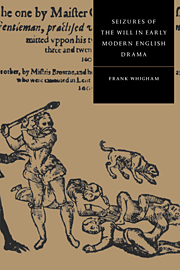Book contents
- Frontmatter
- Contents
- Acknowledgments
- Abbreviations
- Introduction
- 1 Forcing divorce in The Spanish Tragedy
- 2 Hunger and pain in Arden of Faversham
- 3 The ideology of prodigality in The Miseries of Enforced Marriage and A Yorkshire Tragedy
- 4 Sexual and social mobility in The Duchess of Malfi
- Afterword
- Notes
- Works cited
- Index
2 - Hunger and pain in Arden of Faversham
Published online by Cambridge University Press: 17 August 2009
- Frontmatter
- Contents
- Acknowledgments
- Abbreviations
- Introduction
- 1 Forcing divorce in The Spanish Tragedy
- 2 Hunger and pain in Arden of Faversham
- 3 The ideology of prodigality in The Miseries of Enforced Marriage and A Yorkshire Tragedy
- 4 Sexual and social mobility in The Duchess of Malfi
- Afterword
- Notes
- Works cited
- Index
Summary
Arden of Faversham is a history play. It situates various local seizures – of land, of wife, of life, of self – in the aftermath of Henry VII's seizure of the monasteries in the 1530s. These struggles have much to teach us about the cultural phenomenology of desire released and distributed by that founding act so paradoxically called the Dissolution. Its many catalytic effects – economic, social, ideological – precipitated a great deal of new social meaning. Arden of Faversham seems to me a direct dramatic study of the fruits of the Dissolution. The play's interrogations of hypertrophies of the will, so nourished by the newly unbound land market, involve three groups of characters, situated in unusually full social detail.
The principal group enacts a social struggle in the terrain of sexuality. Arden, leading grasping landowner of Faversham and direct beneficiary of the Dissolution (as the play's first lines make explicit), has married gentle Alice – possibly at her family's wish, to block her improper passion for Mosby, a rising servant. Chafing under this arrangement, Alice and Mosby continue or resume or begin their clandestine relations, decide to murder Arden, and eventually carry out their will.
For help with this project, the lovers turn to two different groups of subplot servants. In the first, Mosby's sister Susan is Alice's maid, sought in marriage by two rivals: Arden's loyal personal servant Michael and Clarke, a journeyman painter and technical expert. As family head, Mosby is the proprietor of his sister's sexuality, and offers to sell it to the most useful suitor.
- Type
- Chapter
- Information
- Seizures of the Will in Early Modern English Drama , pp. 63 - 120Publisher: Cambridge University PressPrint publication year: 1996
- 2
- Cited by



